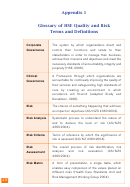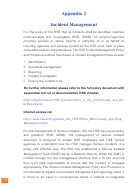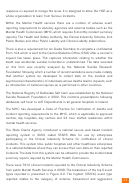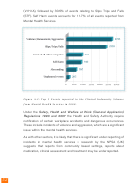Risk Management In Mental Health Services Page 27
ADVERTISEMENT
All mental health professionals have a role to play in both assessing and
managing risk. The perspectives of all disciplines working with the service
user should be taken into account when formulating both a risk
assessment and risk management plan (Morgan, 2007). In accordance
with the recovery approach, the overall assessment and treatment plan
must be developed with the service user so that their perspective is an
integral part of this plan.
3.2 Clinical Risk Assessment and Management
Risk assessment is defined as the overall process of risk identification, risk
analysis and risk evaluation (AS /NZ 4360:2004) as outlined in Chapter
Two. Risk assessment is a process, not an outcome, and allows clinicians
to support their decision making by documenting and communicating the
systematic assessment of the individual. The assessment of risk is an
essential component of the risk management process. Good risk
management is the same as good clinical practice and should be part of
everyday clinical practice (O’Rourke 2003, Morgan 2007).
Clinical risk management is a four step process as follows:
1.
Identification of risk
2.
Analysis of risk
3.
Evaluation of risk
4.
Treating risks
Following all four steps in the clinical risk management process facilitates
informed decision making and positive risk taking. These steps must be
underpinned by communication and consultation together with ongoing
monitoring and review.
Step 1:
Identification of Risk
Safe assessment is dependent on the accumulation and communication of
reliable information and consideration of valid risk factors. Multiple
assessment methods and the use of different sources of information are
important here.
26
ADVERTISEMENT
0 votes
Related Articles
Related forms
Related Categories
Parent category: Business
 1
1 2
2 3
3 4
4 5
5 6
6 7
7 8
8 9
9 10
10 11
11 12
12 13
13 14
14 15
15 16
16 17
17 18
18 19
19 20
20 21
21 22
22 23
23 24
24 25
25 26
26 27
27 28
28 29
29 30
30 31
31 32
32 33
33 34
34 35
35 36
36 37
37 38
38 39
39 40
40 41
41 42
42 43
43 44
44 45
45 46
46 47
47 48
48 49
49 50
50 51
51 52
52 53
53 54
54








